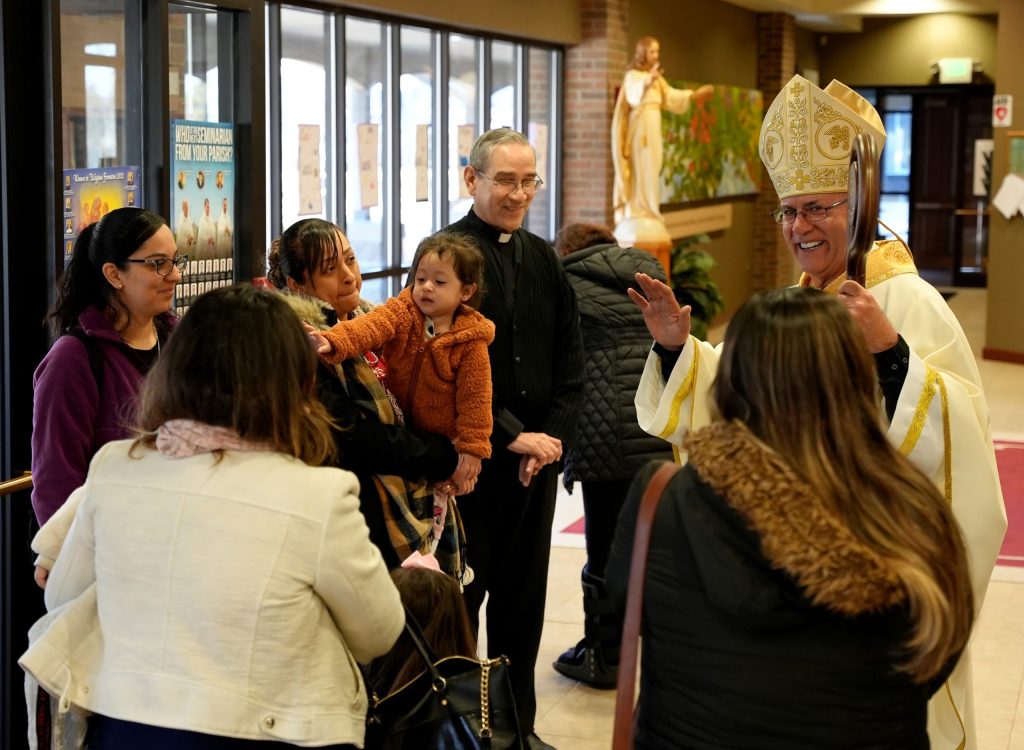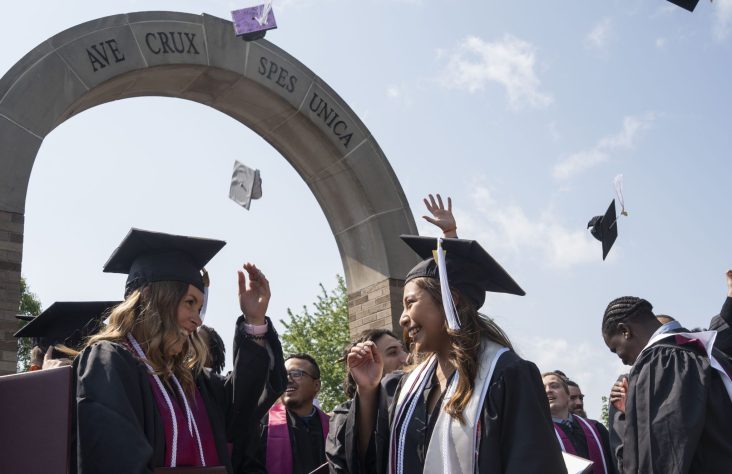June 20, 2023 // Diocese
Indiana Choice Legislation Adds Options for Diocesan Families
“Catholic education aims not only to communicate facts but also to transmit a coherent, comprehensive vision of life, in the conviction that the truths contained in that vision liberate students in the most profound meaning of human freedom,” said Saint John Paul II.
In Indiana, the School Choice expansion for 2023 allows the pursuit of a quality Catholic education for grades K-12 even easier.
“Our Catholic schools have a holistic approach to education, and our teachers play a subsidiary role with parents to educate their children. Whether or not you are Catholic, an estimated 97 percent of families now qualify for a faith-based education that teaches students values and morals while helping them excel spiritually, intellectually, socially, and physically. Our goals are to help students develop a relationship with Jesus Christ within His mystical body, the Church, grow disciples, help students to fulfill their destinies, and the ultimate goal is to help students reach heaven, which is a tremendous value proposition,” said Joseph Brettnacher, Ph.D., Superintendent of Catholic Schools for the Diocese of Fort Wayne-South Bend.

Eric Peat
Indiana’s School Choice expansion, which begins with the 2023-2024 school year, will allow more families to choose Catholic schools in the Diocese of Fort Wayne-South Bend for the education of their children.
One change to the program is that families no longer have to participate in the Choice Scholarship pathways or tracks to qualify.
“The elimination of the Choice Scholarship pathways/tracks means parents have one less hurdle in their way. Now there are two criteria to qualify instead of three. You must meet the income requirements at or below 400 percent Free or Reduced Lunch (FRL), which means a family of four can earn up to $222,000 and qualify. Finally, they must live in Indiana,” said Brettnacher. “Kindergarten students can receive a Choice Scholarship if they meet the above two requirements and reach five-years-old by Oct. 1. Also, schools can use the Indiana — School Scholarship Tax Credit for PreK tuition as an allowable expense (age four by August 1) for accredited PreKs that are part of an accredited school program. Many more families can choose a Catholic school education if it suits their child.”
The new income qualification includes a significant increase in financial eligibility from 300 percent FRL to 400 percent FRL for the Choice Scholarship or the School Scholarship, where donors send their contributions to a Scholarship Granting Organization (SGO). A donor giving $1,000 to an SGO receives a $500 (50 percent) state income tax reduction. The $1,000 goes to the SGO, while the donor receives the state tax credit. For the Diocese of Fort Wayne-South Bend, it is called the Scholarship Granting Organization of Northeast Indiana or SGONEI.
Indiana Choice legislation has allowed many families the opportunity to afford a Catholic education and continues to impact the Diocese of Fort Wayne-South Bend.
“More families residing in Indiana can afford a Catholic education if it best fits their child’s needs. A family does not have to be Catholic to go to our schools. With the School Choice Expansions and the School Scholarship Tax Credit, we should see an increase in enrollment in most, if not all, of our schools,” said Brettnacher.
To learn more about the availability of Catholic Schools in the area and their scholarship options, visit diocesefwsb.org/schools/.
Myths and Facts about School Choice
Although school choice was introduced in Indiana more than a decade ago, it continues to generate questions and debate. Here are some common misperceptions about school choice — along with the corresponding facts — provided by the Indiana Non-Public Education Association (INPEA).
MYTH: School choice drains money from public schools.
REALITY: School choice programs across the country have been proven to save state governments millions — even billions — of dollars. When a student attends a non-public school using a Choice Scholarship (voucher), state governments do not have to pay the public school the full cost for providing an education for that student. In Indiana, the average voucher amount in the 2021-2022 school year was $5,439, while state funding for public schools amounted to $7,968 per student. Public schools receive local taxes for their operations, yet non-public schools do not receive those funds. Public schools also retain their local funding even if students transfer to a non-public school.
MYTH: Choice does not lead to better academic outcomes for students.
REALITY: Across Indiana, as students continue to recover from COVID-19 learning losses, non-public school students outperformed their public-school peers on the 2022 I-LEARN state assessment. The National Assessment of Education Progress, more commonly known as the Nation’s Report Card, shows that nationally, Catholic school students have higher test scores in reading and math than their public-school peers in grades 4 and 8, the year that the assessment is administered.
MYTH: School choice only benefits non-public schools.
REALITY: The state of Indiana recognizes that parents should choose the school that provides the best educational opportunities and is the best overall fit for their children. In Indiana, the money flows to the student, not to the school. Families can choose to send their children to alternative public schools, charter schools, or non-public schools.
MYTH: School choice programs allow for discrimination.
REALITY: Nine out of 10 empirical studies reveal that choice programs lead to less segregation in schools. In Indiana, the population of students receiving vouchers is more diverse (43 percent minority) compared to traditional public-school students (32 percent minority).
MYTH: School choice programs violate separation between church and state.
REALITY: In 2013, the Indiana Supreme Court ruled unanimously that school choice does not violate Indiana’s Constitution. Additionally, the U.S. Supreme Court has ruled that appropriately designed private school choice programs are fully Constitutional.
For a complete list of school choice myths and facts, as well as additional information, visit inpea.org.
— Victoria Arthur
The best news. Delivered to your inbox.
Subscribe to our mailing list today.






